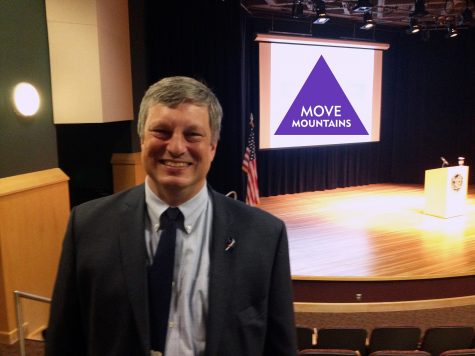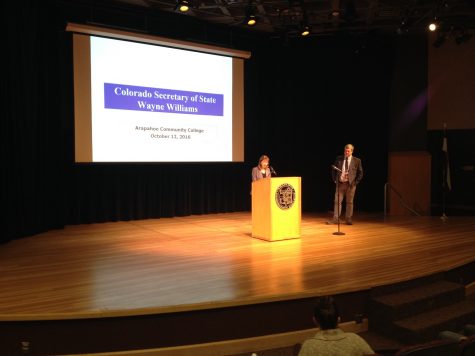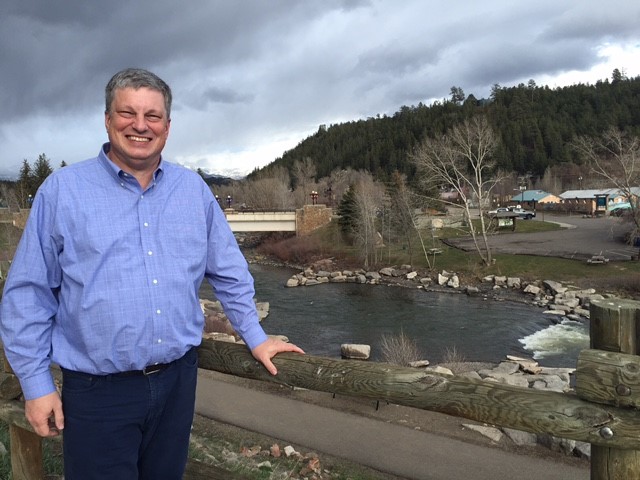It WILL Count: Colorado’s Secretary of State Urges You to Vote!
Colorado’s 38th Secretary of State, Republican Wayne W. Williams, was proudly welcomed at ACC last week on Wednesday to canvass the issues concerning the 2016 ballot initiatives.
Williams, a Virginia native, with a keen sense of commitment to public service and civic engagement, was cordially introduced with a few kind words by ACC President Dr. Diana Doyle.
The event took place in the contemporary Warring Theatre, continued for two hours that afternoon, then concluded in an open-forum style question and answer session.
A former El Paso County Clerk & Reporter, Williams appreciates the meticulous nature of electoral work and is driving a strong initiative to make registration as easy and convenient as possible for Coloradoans.
“You don’t have to go to downtown Denver to do anything. We try and make it so you can do everything you need from your computer.”
As one of the first states in the country to introduce an online registration system, Colorado pioneers in the field of facilitating voter registration.
Still, if even that becomes too daunting, people also have the option of texting ‘CO’ to ‘2VOTE’ (28683), on their smart phones which directs them to a link of the secretary of state’s voter registration and election information web page.
“Another significant concern that people have is security,” informed Williams.
“In Colorado, none of its tabulation systems [machines that count the ballots] are connected to the internet. They are kept in a locked room under video surveillance with tamper evidence seals. A lot goes into these rooms.”

According to Williams, the security features are virtually impenetrable unless one possessed the untenable dexterity á la Tom Cruise of Mission Impossible. But for good measure, the ballot machines are also tested before and after the elections to positively rule out any possibility of foul play.
Appearing on the November 8th ballot are a total of nine ballot measures – two legislative referrals and seven initiatives with issues including – but not limited to – civil rights, taxes, minimum wage and healthcare.
Amendment T, for instance, a civil rights issue referred to the ballot by both chambers of the state legislature (Democrat & Republican), would eliminate reference to slavery in the state constitution.
“Right now, Colorado prohibits slavery and involuntary servitude, except as a condition of sentence for a crime,” explained Williams.
Convicted criminals in the state of Colorado may be sentenced to hard labor, in-prison work assignments and other mandatory programs unless they are enrolled in education programs. If the Amendment passes, it would abolish this form of punishment exempting those incarcerated from being forced to work.
However, the initiative could jeopardize working programs like community service and other alternatives to prison sentences, which could be interpreted as forms of involuntary servitude under Amendment T.
The second state legislative referral is Amendment U, which targets property taxes for businesses that use government-owned property for private benefit. The property tax is based on the market value of the land and Amendment U proposes the abolition of this tax if the property’s market value is less than $6000.
At present, about 7000 business in Colorado are affected, with advocates for the Amendment asserting that the administrative cost, usually exceed the claimed property taxes.

When asked by an Arapahoe Pinnacle reporter what message the Secretary of State would like to convey to ACC students who might be interested in a field of politics (given the state of politics in the country today), Williams responded with a personal narration:
“We didn’t have a graduating class for 1959 in Warren County high school, my alma mater. Why, you ask? Well, the folks in charge of the county -when the order came from the court to integrate the schools- said we just won’t have schools anymore.”
Displeased with the situation, Williams went on to describe how at the tender age of 17, he and several classmates, not eligible to vote yet, pressed for change outside of every polling station in their town until they prevailed.
“So my message is: get involved; you can make a difference. Don’t just sit back and complain about the situation: be an agent of change. It took nearly a hundred years, but those folks [in Warren County] aren’t there any longer.”
A member of the audience, who was uncertain about whether her vote towards the upcoming Presidential Election would actually count, expressed her concern to the Secretary of State.
“Your vote, assuming you are casting a legal ballot in Colorado, counts. In fact, it counts more here than anywhere else in the country.”
The reason, as Williams reported, lies therein that Colorado is one of the few swing states; therefore, a vote cast here has a higher chance of impacting the outcome.
A father of four, Williams lives in Colorado Springs, where besides his elected Office duties he operates a small business, focusing on labor and employment law matters. He encourages eligible voters to register at their earliest convenience and reminded them that ballots to domestic voters will have been mailed out starting October 17.
To review the rest of the ballot issues, please visit govotecolorado.com. You can also register to vote online and confirm voter registration information.



